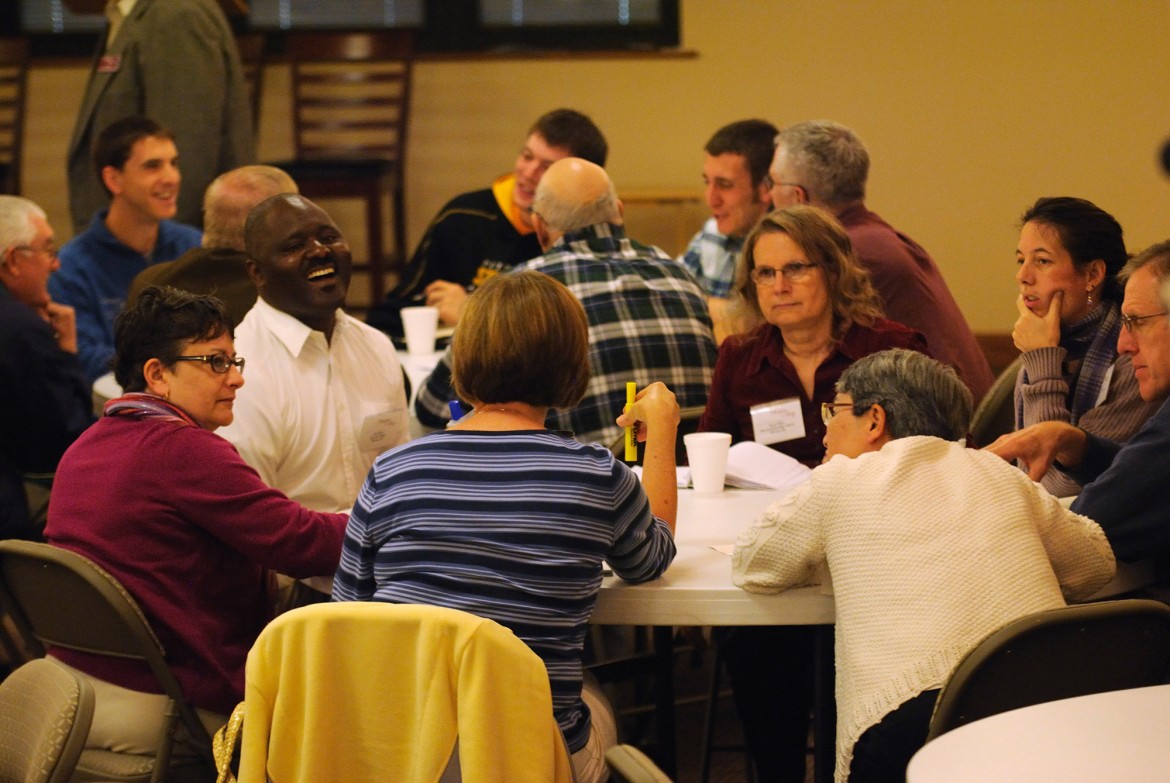Pastors, students, church leaders and members and other interested people gathered for the 12th annual Anabaptist Vision and Discipleship Series (AVDS) at Hesston College October 28 to 30. The theme for 2011 was “Getting Beyond Them and Us – to We.”
Speaker presentations and breakout sessions with topics chosen by participants were used to discuss the tension of the church’s call to be both distinctive and open to those who are unfamiliar with Anabaptist or Mennonite theology.
Hal Shrader, pastor of Trinity Mennonite Church (Phoenix, Ariz.), pointed to Acts 15 to remind participants that cultural differences are a historical part of the church, but that those differences should not hinder the church to reach out to new people.
“We need to make space for people without burdening them or unsettling their minds,” said Shrader.
Speaking as one who was attracted to the Mennonite church because of the theology and the way he saw theology being lived out, Shrader stressed to participants that it is important for church members to remember that new people are not attracted to the Mennonite church because of the rich heritage and traditions.
“People are seeking an alternative to the mainstream culture,” said Shrader. “They come because they are attracted to what Mennonites believe and the ways those beliefs get lived out.”
Shrader, along with Joanna Shenk, associate for Interchurch Relations and Communication with Mennonite Church USA in Elkhart, Ind., and Anton Flores-Maisonet, co-founder of Alterna, a missional community of U.S. citizens and Latin American immigrants in LaGrange, Ga., were the featured speakers for the weekend.
None of the three grew up in the Mennonite tradition, but chose Anabaptist faith and theology in their adult lives. Throughout the weekend, they shared their personal stories of discovering and approaching Anabaptism and Mennonites.
Like Shrader, Flores-Maisonet was not attracted to the cultural practices that are often defined and highlighted within Mennonite communities.
“The best way to introduce new people to the church is to fully incarnate the values you claim,” said Flores-Maisonet. “I was attracted to peace and justice and diversity in the Anabaptist tradition.”
Flores-Maisonet, who grew up in the Catholic church, left his tenure-track social work faculty position at a United Methodist college to live in solidarity with unwelcomed Latin American immigrants through Alterna.
“God wove seemingly unconnected threads into my life that led me to Anabaptism,” said Flores-Maisonet. “Now I am sharing my life in a very intentional way.”
For Shenk, Mennonite worship seemed to lack the vitality she was familiar with in her evangelical upbringing.
“During my first encounters with Mennonites, I felt the theology lacked a vibrant spirituality,” said Shenk. “I wasn’t thinking about the importance of community and loving one’s neighbor and the other things that Mennonites understand and do so well. I found people in the church who would wrestle through my questions with me and I came to view a vibrant faith differently.”
Even as the speakers encouraged participants to remember the history of the Mennonite church and theology, they discussed practical ways to be inviting for those unfamiliar with it.
“Christ is the center of the Christian tradition,” said Flores-Mainsoet. “We only need to see the disagreements in the church as insignificant and keep our eyes on the prize. We have a wonderful opportunity as one stream of living water that understands that only through self-giving love can we ever understand what true reconciliation looks like.”
Participants broke into groups for several sessions to discuss topics of their choosing and that offered opportunities to share and learn from one another’s experiences in their own churches. Some topics included “Deciding what it means to be a Mennonite,” “The centrality of Jesus in a world of religious pluralism,” “How to make baptism about true conversion” and “Being a peace community in a world of violence and injustice.”
“This weekend I gained a new perspective on what it means to be Mennonite and how I probably come off to those who aren’t familiar with the church,” said Aimee Kauffman who attends Journey at Yoder (Kan.), a satellite congregation of South Hutchinson (Kan.) Mennonite Church. “It’s good to be made aware of when we might come across as exclusive and to think about effective ways to communicate our beliefs with others.”


